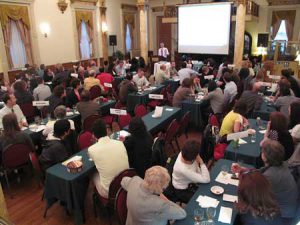
Ministry of Truth rolls to trivia title
By Neale McDevitt
Chemistry students should take solace that professor David Harpp is a little less demanding of them than he is of the participants in the series of trivia events he organized this past school year.
“Over the course of the year, the percentage of right answers has been a little over 50 per cent,” he said of the latter. “That’s good because it means it isn’t a slam dunk for anyone.”
Q: What do you call the plastic tip on the tips of your shoelaces? A: Aglet
Harpp was the mastermind – some would say an evil one – of the six-event series that began last October and ended earlier this month. The long-time chemistry prof admits to having only attended his first trivia event a few years ago at Colgate University while visiting his daughter who was teaching there. “It was a great mix of students and faculty with everyone yelling ‘Yes!’ when they answered something correctly,” he said. “It was intense and sweaty and very fun.”
As President of the Faculty Club, Harpp is always looking to attract people to the McTavish Street landmark, and what could be more McGill, he thought, than a little friendly competition that involved lots of grey matter?
Q: The U.S. produces more beef than any other country in the world. Which country is second? A: Brazil.
The trivia nights were held in the Faculty Club’s beautiful ballroom. Most events were sold out, meaning 30-31 teams of four squared off each night for the seven rounds of 10 questions. The $5 per person entry fee went to Centraide and, when the dust finally settled, approximately $2,500 was raised for charity.
In all, 46 different teams participated over the course of the year. Some were one-hit wonders while others took part in all six events. Like all good trivia competitions, team names invoke as much laughter, and head scratching, as the questions themselves. Who doesn’t love a competition in which Axes of Evil, Boom Down Go Fudd, and Ignorance and Want (Team X) square off against No Sensible Shoes, Honey Badger Don’t Care and the Full Monty Pythons?
Q: What object is central to Stompin’ Tom Connors’ act? A: The board he stomps on.
Of course, in the end, only one team can lay claim to the championship belt and that honour belonged to The Ministry of Truth, a squad largely comprised of employees and spouses from the Public Affairs department. “Another team won the first two events, but the Ministry came on strong and won the last four going away,” said Harpp. “They had a deep bench and they came out swinging every night.”
“I guess we take our trivia seriously,” said Doug Sweet, Director of Media Relations for McGill and a founding member of the Ministry of Truth. “But, seriously, this was a lot of fun, David worked really hard to make it challenging and interesting – and we ended up learning a lot in the process. For example, I will not forget for the rest of my life the fact that it was Michelangelo and not da Vinci who designed the costumes for the Swiss Guard at the Vatican. Because I had persuaded my team that it was da Vinci, even after someone else had come up with the right answer.
“And raising so much money for a cause like Centraide just makes it all worthwhile.”
In the end, the trivia was such a success that Harpp has already started planning next year’s challenge. “The one thing that was a little disappointing was that only a very few professors participated,” said Harpp. “Some of the groups that were well-represented included support staff from Admissions, the Principal’s Office, DAR, the libraries, Public Affairs, IT services, music administrators, the Planning Office, Sustainability, Student Services and maybe 10 or so students… but where are the profs? Afraid?”
And Harpp’s favorite answer? “I asked this question; if a bibliophile was a collector of rare books, what is a bibliopole? Not many got it right (a seller of rare books) but one team said ‘a well-read stripper,’ and I thought that was pretty funny.”
